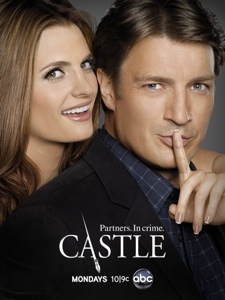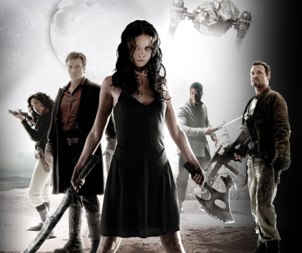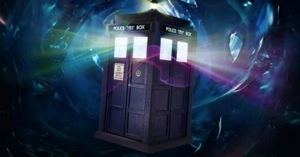While growing up, I devoured the works of Edgar Rice Burroughs and H.P. Lovecraft, and a visit to a bookstore seemed as magical as a trip to Ali Baba’s cave. Caught in the web of Burroughs writing, I could swear I was swinging through the trees with Tarzan, or fighting all sorts of nightmares to win the hand of Barsoom’s Dejah Thoris. And as for Lovecraft, well, he just scared the hell out of me. I loved it.
Sadly, Burroughs hasn’t aged very well. In his day, Burroughs got away with populating Africa with all manor of lost civilizations deep in the unexplored forests of the “dark continent”. A hard sell, however, in the era of Google Earth.
And as for traveling to Mars by… wishing yourself there? A bit much for even young children to swallow today. Mind you, do you remember the story that Carl Sagan related while hosting the original Cosmos? After reading John Carter of Mars, he ascended a hilltop and wished and wished and wished. But, sadly, he never found himself transported to the red planet.
Then there’s the quaint notion that, to make his mark, man is destined to tear apart nature and build things like railroads and smokestacks. Witness the Pellucidar books, where our heroes find themselves in an ancient, primeval forest in the centre of the Earth. Their hearts swell with pride after they’ve cut down trees, lain tracks, and constructed steam-engine trains that puff thick smoke into the pristine air.
Finally, even if we grant that Burrough’s audience is/was primarily boys, aged, say, 9-12, his books have structural problems with his over-reliance on the most amazing coincidences. So yes, it’s kind of hard to go back to these books, nostalgic as one might be.
 H.P. Lovecraft has fared better, and is still regarded as a major figure in horror literature. While his writing style is definitely of the old school–Lovecraft loved old things and old places–he is still able to make your skin crawl, and, when he wants to, can dazzle you with beautiful prose. The novella, “The Dream Quest of Unknown Kadath”, begins thusly:
H.P. Lovecraft has fared better, and is still regarded as a major figure in horror literature. While his writing style is definitely of the old school–Lovecraft loved old things and old places–he is still able to make your skin crawl, and, when he wants to, can dazzle you with beautiful prose. The novella, “The Dream Quest of Unknown Kadath”, begins thusly:
Three times Randolph Carter dreamed of the marvellous city, and three times was he snatched away while still he paused on the high terrace above it. All golden and lovely it blazed in the sunset, with walls, temples, colonnades and arched bridges of veined marble, silver-basined fountains of prismatic spray in broad squares and perfumed gardens, and wide streets marching between delicate trees and blossom-laden urns and ivory statues in gleaming rows; while on steep northward slopes climbed tiers of red roofs and old peaked gables harbouring little lanes of grassy cobbles.
I never tire of that opening.
While we can agree that Lovecraft didn’t expend a lot of energy into fully fleshing out his characters, that was never the point. The point was to develop an atmosphere of dread that would have the hairs on the back of your neck stand up and your body temperature drop a couple of degrees; to make you begin to doubt the veracity of your own senses; to create a world where the old gods, separated from our plane of existence by the flimsiest of veils, hungered for our souls.
Yikes!
Lovecraft could also be oddly prophetic, as in this excerpt from “The Call of Cthulu”:
The most merciful thing in the world, I think, is the inability of the human mind to correlate all its contents. We live on a placid island of ignorance in the midst of black seas of infinity, and it was not meant that we should voyage far. The sciences, each straining in its own direction, have thitherto harmed us little; but some day the piecing together of dissociated knowledge will open up such terrifying vistas of reality, and of our frightful position therein, that we shall either go mad from the revelation or flee from the light into the peace and safety of a new dark age.
Could it be that the discoveries of modern science have caused some to go mad, seeking a new dark age where the climate isn’t changing, evolution never happened, and vaccines are to be avoided at all costs? Perhaps. But that’s a blog post for another time.
But now we get to the crux of the problem, which is the intolerance expressed in the stories of these and other writers. For example, in Burrough’s At the Earth’s Core:
“A white man!” he cried. “May the good Lord be praised! I have been watching you for hours, hoping against hope that THIS time there would be a white man.”
And as for Lovecraft, this quote from “The Case of Charles Dexter Ward” will indeed make your skin crawl, but not in a good way:
Here his only visible servants, farmers, and caretakers were a sullen pair of aged Narragansett Indians; the husband dumb and curiously scarred, and the wife of a very repulsive cast of countenance, probably due to a mixture of negro blood.
One could point to many other authors, including Enid Blyton with her Golliwog characters, Ian Fleming’s James Bond referring to Italians as a bunch of “spaghetti eaters”, going right back to the controversial Shylock in Shakespeare’s “The Merchant of Venice”.
What do you do with books like these? One answer, I suppose, is to put them away. But to not read some of the greatest, most beloved authors of all time? It seems unthinkable. To a large extent, I believe, these authors were a product of the age in which they lived, though some, like Lovecraft, through his love of times gone by, may have reflected even earlier beliefs and prejudices. We know that prejudice must have been part of the social norms of the time. How else could such stories have been published?
My inclination is to follow the advice of B. J. Harrison. In in his Classic Tales podcast, Harrison reads aloud books and stories that are, well, classics. Noting the presence of anachronistic prejudice in one story, he said something like this (I’m paraphrasing from memory): Perhaps we should view stories such as these as a lens through which we can see how far we have come.
Consider now the case of the World Fantasy award trophy. I was initially disappointed upon hearing that it would no longer be modelled after H. P. Lovecraft. But digging into the reasoning led me to understood completely. After all, suppose you were, say, a gay black author, that you won a World Fantasy award, and thereafter had to stare into the disapproving glare of Lovecraft from your fireplace mantle. No, I wouldn’t care for that either. In fact, it sounds like a suitable basis for a horror story…
There’s an even thornier question: What to do about intolerance expressed by current authors? Today, no one would get away with the kind of prejudice shown in the examples above (unless you were giving voice to a character with prejudice). That’s not the problem. The problem is when a published author promotes opinions or beliefs that you find offensive. For me, two authors come immediately to mind, one dead, one living. Both have written classic books in the SF&F genre. But while their books may be benign, I find their voiced beliefs and opinions to be offensive. Initially I tried to put that aside, concentrating on the book, not the author. In the end I found that the books suffered from guilt by association. I just can’t and won’t support them any longer.
This is an essay without any conclusion, I’m afraid, except to note that each of us, when faced with these kinds of moral dilemmas, has got to do what we’ve got to do. However, there’s one thing we can’t do under any circumstances, and that’s to ban books outright. That only deprives us of the opportunity to think and to follow our own path.

 Landbound, the Doctor Who short story that I wrote, is now available as a
Landbound, the Doctor Who short story that I wrote, is now available as a  As has been announced by
As has been announced by 



 H.P. Lovecraft has fared better, and is still regarded as a major figure in horror literature. While his writing style is definitely of the old school–Lovecraft loved old things and old places–he is still able to make your skin crawl, and, when he wants to, can dazzle you with beautiful prose. The novella, “The Dream Quest of Unknown Kadath”, begins thusly:
H.P. Lovecraft has fared better, and is still regarded as a major figure in horror literature. While his writing style is definitely of the old school–Lovecraft loved old things and old places–he is still able to make your skin crawl, and, when he wants to, can dazzle you with beautiful prose. The novella, “The Dream Quest of Unknown Kadath”, begins thusly: This summer I spent a few days in Zurich, Switzerland. Now there is a public transit system that is solid in every way. Their public transit is based on trams that connect to the central train station. At each tram station, there’s an automated ticket dispenser that supports English, German, French and Italian. A series of on-screen choices guides you to the ticket you want. Frequently requested tickets, such as to the Zurich airport, are right on the home screen. You can pay with credit card, or, since Switzerland widely supports tap-and-pay, you can use your smart phone. Overhead displays count down the minutes until the next tram’s arrival.
This summer I spent a few days in Zurich, Switzerland. Now there is a public transit system that is solid in every way. Their public transit is based on trams that connect to the central train station. At each tram station, there’s an automated ticket dispenser that supports English, German, French and Italian. A series of on-screen choices guides you to the ticket you want. Frequently requested tickets, such as to the Zurich airport, are right on the home screen. You can pay with credit card, or, since Switzerland widely supports tap-and-pay, you can use your smart phone. Overhead displays count down the minutes until the next tram’s arrival. What’s been so engaging about the Beckett-Castle relationship is the apparent chemistry between the two actors, and the range of emotions they display so unerringly. They are, truly, a very cute couple. This relationship is a key anchor point for many viewers, who have immensely enjoyed the show over the years.
What’s been so engaging about the Beckett-Castle relationship is the apparent chemistry between the two actors, and the range of emotions they display so unerringly. They are, truly, a very cute couple. This relationship is a key anchor point for many viewers, who have immensely enjoyed the show over the years.